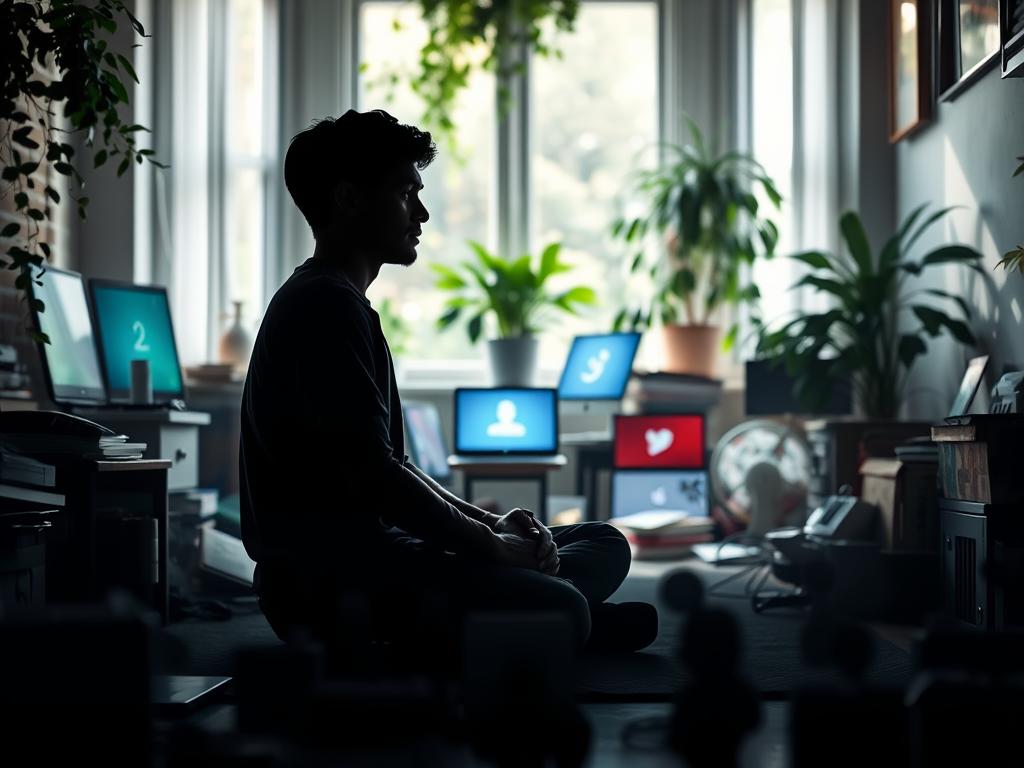Nearly half of smartphone users in the United States say they can’t live without their devices. This shows how much we rely on social media, from Facebook to Instagram. It eats up almost all our time. I’ve been deeply involved in using these platforms for work since 2008. I’ve felt the impact on my mental wellness and clarity.
After six years of checking my phone way too much, even during short drives, I felt overwhelmed. Feelings of cynicism, anger, and distress made me try a 30-day social media break. This detox brought me back my emotional balance. I also felt like I had more free time.
A month without social media made me happier and more productive. My sleep got better too. This matches what studies say about social media detoxes. Consider how cutting off from these online worlds can bring you peace. In this article, I’ll show why a detox is needed. I’ll also share tips on how to do it, helping you improve your mental health and social life.
Key Takeaways
- Social media addiction can negatively impact mental health and emotions.
- A social media detox can enhance mindfulness and mental clarity.
- Disconnecting from social media improves overall well-being and reduces anxiety.
- Realizing the adverse effects may drive the need for a social media break.
- Establishing healthy boundaries can help facilitate a successful detox.
Understanding the Necessity of a Social Media Detox
In our digital world, social media greatly shapes our daily lives. It impacts our mental health, sometimes causing anxiety, depression, and feelings of not being enough. As we rely more on these platforms, our mental health may suffer. Many of us often scroll without thinking, which shows why a detox is needed.
A deeper look into this habit reveals the importance of taking a break from social media.
The Impact of Social Media on Mental Health
Studies tell us that using social media for more than two hours a day can hurt our mental health. A survey showed 56% of people felt less worried and stressed after a social media break. I’ve felt this too. During my break, I saw how my feelings were tied to my online life. Alerts and notifications can distract us, leading to habits that harm our digital well-being.
Signs You Need a Social Media Break
It’s essential to notice when social media starts to drain you. Feeling upset after scrolling is a clear sign. I’ve felt annoyed after seeing others’ posts, pointing out I needed a break.
Other signs are checking your phone too much for updates, which can feed into anxiety. If this sounds like you, think about taking a break. Even if it’s just for an hour in the morning or before bed.

Social Media Detox: How to Implement It Effectively
Starting a social media detox needs careful planning to work well. It’s important to set goals that fit my lifestyle. For jobs requiring social media, setting specific times for use is helpful. This keeps me in control of my screen time while I do my job. Cutting down to 30 minutes of social media a day helps my digital health a lot.
Setting Realistic Goals for Your Detox
When I start a social media detox, setting clear goals is key. They keep me on track and excited. Using apps like Flippd or Moment helps me track and cut down on social media. These apps not only watch my time online but also push me to have more self-control. By cutting down gradually, I find more lasting success.
Creating Healthy Boundaries and Alternatives
It’s important to make rules about when I use social media to be more present. Making times like meals or bedtime device-free is a good start. I try to replace social media time with things that are good for me. Taking up hobbies like painting or cooking cuts down my screen time and boosts my happiness. Meeting friends face-to-face instead of online makes my relationships stronger.
Conclusion
Taking a break from social media improved my mental health and focus. My experience showed me the real effects of a detox. It made me happier, more productive, and calmer.
Research supports that too much social media can increase anxiety and depression. Knowing this pushed me to change my habits.
Stepping away from screens gave me back time and emotional energy. I found more joy in talking to people face-to-face. It made me feel more connected and alive.
This journey brought me mindfulness and a greater love for the little things. It reminded me of what truly matters.
If digital noise is wearing you down, try pausing your social media use. It can help you build better tech habits. And lead to a happier, more satisfying life.